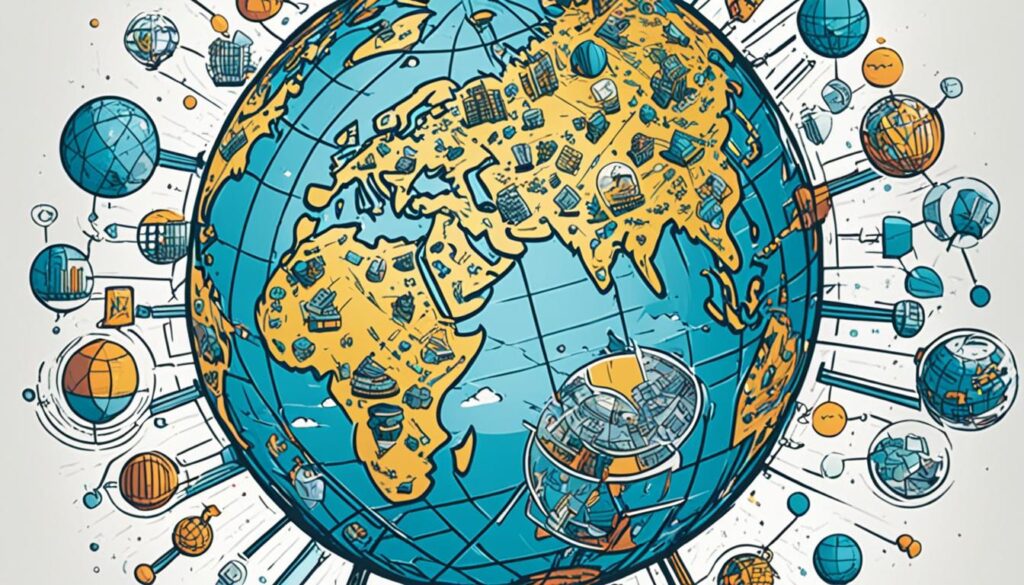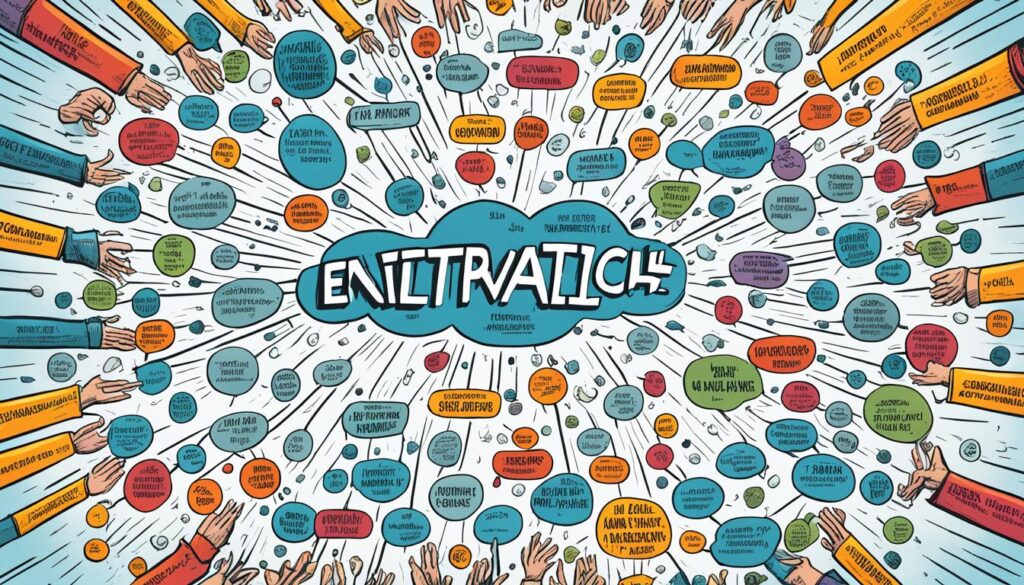In today’s fast-moving world, can you truly avoid AI? It’s everywhere, from smart tech predicting what you’ll type next, to advanced systems such as ChatGPT. When ChatGPT came out in November 2022, we saw a big change. Its launch made many curious but also a little worried about AI’s future, especially in schools. This article looks closely at how AI is mixing with our lives. It focuses on the risks, ethical issues, and ways to keep it in check.
Deciding what to do with AI is complex. Should we avoid it, try to keep up, or jump right in? Each choice has its own details and needs, showing why we must develop AI responsibly. Making AI with ethics in mind and being open about it is key. It helps us blend tech advances with what’s good for us all.
The Rise of AI in Modern Society
Artificial intelligence (AI) is changing the game, transforming industries and our lives. It’s great at handling complex tasks and showing us new perspectives. In this quick-moving tech era, understanding AI’s impact is key. We should look into using AI responsibly, which means avoiding just relying on machine learning. This way, we can lessen AI-related risks and think about not using AI in some situations.
AI’s Transformative Impact on Industries
AI does more than just automate simple jobs. It’s changing entire industries by tackling deep data analysis and decision-making. This spans from healthcare to finance and beyond, making things more efficient and innovative. With tools like machine learning, companies can fine-tune how they work and give customers an even better experience. But with these cool AI benefits come some risks. So, focusing on how to handle these risks is a must.
Emerging AI Technologies and Their Applications
Many AI technologies are now emerging and having a big impact. Think of things like understanding speech, seeing the world through computers, or even robots. They’re not just in science fiction. AI assistants like Siri and Alexa are part of our everyday lives, making things easier. In healthcare, AI helps with diagnosing, discovering new drugs, and planning treatments. And in finance, it’s key for spotting fraud and making trading more efficient. As AI grows, we need to think about approaches without AI and how to use AI ethically.
AI brings a lot of chances but also challenges, especially about jobs. It might automate about 30% of tasks we do. So, we need to be ready for changes and think about other options. Learning new skills and adapting to an AI-heavy world is vital. This way, we can keep up and lower the risks to our jobs.
To make the most of AI, we have to focus on doing AI right. This means being open about how AI is used and making sure it’s fair. Setting up good rules for AI and designing it with people in mind are important steps. By working together, we can make a future with AI that’s good for everyone. This includes knowing when not to use AI and not putting all our trust in it.
Understanding the Pervasiveness of AI
Artificial intelligence is now a big part of our lives, even if we don’t realize it at first. It’s in our smartphones suggesting the next words as we type and in Netflix recommending shows we might like. This tech silently improves our digital world. We should think about how much AI is now everywhere and what that means for us.
AI in Everyday Life: From Smart Devices to Predictive Analytics
Smart devices are a clear example of AI in action. We talk to Siri, Alexa, and Google Assistant, and they answer thanks to their smart AI. They help us remember things, control our homes, and suggest what to watch or listen to. As they learn from us, they get better at serving our personal needs.
AI also helps in business by using data to understand patterns and make predictions. In shops, AI can look at what people buy and when, then suggest better ways to stock, market, and keep customers happy. In healthcare, it can predict diseases or make treatments better, which means looking after sick people more effectively and quickly.
The Invisible Presence of AI in Digital Services
Apart from visible AI in smart gadgets and data analysis, many digital services also run on AI. Social media shows us things we’d like based on our actions and interests. It also helps in e-commerce by suggesting products we might want, making shopping easier and more attractive.
Still, we need to watch out for AI’s possible downsides. Things like making unfair decisions, keeping our data safe, and preventing misuse are big issues. We must use AI carefully, making sure it does more good than harm. This means creating it with people’s wellbeing in mind, and looking at ways to stop bad outcomes.
We’re entering an age where AI is all around us, changing the way we live and connect. It’s important we understand its role and effects. By choosing to use AI wisely and pushing for it to be developed with care, we can steer its benefits towards a better future. This lets us tackle the new challenges and find opportunities ahead.
Can You Avoid AI?
Today, the increasing use of artificial intelligence makes avoiding it tough. AI is in almost every part of our lives, like school, work, fun, and talk. Trying to stay AI-free is a big challenge. We will look at the chances of staying away from AI. We will also see how we might reduce the risks from AI.
Assessing the Feasibility of an AI-Free Lifestyle
Some people are trying to stay away from AI’s rise. For example, in schools, they’re cutting back on using intelligent systems for tests. They’re avoiding these to keep AI out of their educational experience. But, as AI gets better and can do more, this no-AI push might not work forever.
The Challenges of Navigating an AI-Driven World
Trying to avoid AI’s influence is hard. It’s in things like picks on TV and talking to virtual helpers. AI is tightly woven into our lives. So, living without it is quite hard.
As AI spreads further, not using it may become a disadvantage. Doing things to challenge AI may help for a while. Yet, we also need to use AI smartly to keep up. It’s about finding a good mix of using AI and staying safe from its downsides.
The Benefits and Risks of AI Integration
Artificial intelligence (AI) is blending into our lives more than ever. It’s important to weigh the benefits against the risks. AI can significantly improve efficiency and productivity. Yet, it also brings ethical issues. These need addressing for its responsible use.
Enhancing Efficiency and Productivity through AI
AI is excellent at making work smoother and more efficient. It automates tasks and sifts through large data quickly. This allows organizations to make better choices, manage resources well, and boost productivity.
This improvement can save costs, speed up innovation, and make customers happier.

Additionally, AI can help people do things that require human skills. It lets us focus on tasks needing creativity, logic, or empathy. By working with AI, businesses can create teams ready to face the complex business world better.
Addressing Ethical Concerns and Potential Drawbacks
Even with its many benefits, AI has dark sides. The data it’s trained on can be biased. This might lead to unfair outcomes for some people.
There’s also worry about AI in war. Using it to make weapons raises serious ethical issues. The Campaign to Stop Killer Robots calls for its careful and ethical use.
As AI gets smarter, it can also copy work in ways that question who owns it. This brings up issues of intellectual property and copyright. These challenges need careful thought to protect artists’ and creators’ rights.
Dealing with these issues mandates strong ethical guidelines and clear accountability. It’s also crucial to listen to various voices, including the public. Only by working together can we ensure AI benefits everyone while avoiding significant harm.
Strategies for Responsible AI Adoption
Artificial intelligence (AI) is making big strides in our lives. It’s key to use AI in ways that are safe and ethical. This means designing AI with people in mind and being clear about how AI works. We want to make sure AI helps society without causing harm.
Making AI safe is important. We need rules and tests to stop AI from hurting us. Using real, honest data is critical, especially on social media. We should make sure AI doesn’t hide important truths. This way, AI can be a force for good and keep information true.
We also must think about ethics when developing AI. AI should reflect our shared values and aim to help everyone. Being transparent in AI creation is crucial. It builds trust and lets us know how AI operates. This openness helps keep developers responsible for what their AI does.
Focusing on these key points will lead to better, ethical AI. It’s a team effort by businesses, schools, and those who make the rules. Together, we create the right rules for AI. We must always be careful in using AI to protect people’s well-being and society as a whole. This is essential for AI to be a positive force in our world.
Balancing Human Autonomy and AI Assistance
Artificial intelligence is changing our world fast. This makes finding a balance between our freedom and AI help very important. AI can make things more efficient but we must keep control. It’s key to work together with AI for the best results. This part looks at making AI more about people, making rules for using AI, and checking AI use to avoid problems.
Maintaining Control in an AI-Enhanced Environment
Many worry about AI taking their jobs. We can’t be sure if the increase in AI means we will all lose our jobs. Some say AI will help us do better at our jobs. It will be like having a super teammate. We need to be ready, just in case. We must find ways to stay important in a world with lots of AI.
Creating AI that puts people first is super important. This means AI should be easy to understand and follow human values. Setting up rules and ways to check on AI can make us trust them more. This trust means we let AI help us without losing control over our choices.
Collaborating with AI for Optimal Results
AI can do many jobs for us, but that doesn’t mean fewer jobs for people. It’s more about changing how we work. This change asks us to do more creative and thoughtful jobs. By working hand in hand with AI, we can strive together for the best outcomes.
Working well with AI means we need to make good rules and plans. These must keep AI safe and beneficial for everyone. With the right steps, we can enjoy AI’s help while safeguarding against any harm.
Finding the right mix of new ideas and being good to others is hard. It needs tech makers, law writers, and thinkers to work together. With clear rules, we can make AI work for the better of us all.
Preparing for an AI-Driven Future
We are at a critical moment, entering an era powered by artificial intelligence (AI). It’s vital to get ready for the big changes ahead. The fast AI technology growth means we have to prepare now to use AI well. We must welcome responsible AI development and follow ethical AI frameworks. This way, AI can become a key factor in helping people move forward.
The ’embrace’ method of AI in education is key. It helps students get ready. Soon, AI will be more than just a tool; it will be part of our jobs. Teaching AI in schools will give students the skills and knowledge they need. This will let them use AI the right way. But, making sure everyone can get AI tech and teaching educators how to use it well is important too.
Developing AI Literacy and Adaptability Skills
Knowing about AI and being able to adapt are very important. We must understand what AI can and cannot do. By learning about AI, we can make smart choices. We can also work with AI to create a better future. Learning how to adapt helps us keep up with new AI changes and find new opportunities.
AIs are becoming a bigger part of our lives. We need to design AI around people’s needs to help, not hurt. Putting people at the center of AI will make sure it makes our lives better. AI transparency guidelines and accountability measures are key. They help build trust and get people involved in how AI is made and used.
Embracing Lifelong Learning in the Age of AI
As AI grows, our jobs will change. To stay important in a world with AI, we must keep learning throughout life. By always learning new things, we can work together with AI. This way, we use AI to improve our world.
But, getting ready for AI’s future is not just up to one person. It’s a team effort. We need good rules and ways to protect workers as AI grows. Leaders and researchers must work together. They need to solve artificial intelligence risks and keep AI safe for everyone.
Working together, we can guide AI’s future in a good direction. By using AI wisely and keeping learning, we can make a better world for everyone.
Shaping Ethical AI Policies and Regulations
Artificial intelligence is becoming a big part of our world. It’s key to set up ethical and responsible AI guidelines. This way, AI can be designed to help people and not harm them.
Ethical AI must be clear and open. Guidelines for transparency will make users trust AI more. People want to know how AI works and uses data. Holding developers accountable is equally important. They should be responsible for any harm their AI causes.

Making AI safe is critical. We need to address risks and put safety measures in place. This ensures AI won’t hurt us. By following good practices in safety, AI can be a force for good.
AI languages should not create divides. The focus on a few languages limits internet access. With so many languages worldwide, we must make AI for everyone. This means including all languages in AI development.
AI will keep growing in our lives. It can do a lot of good if used right. We need to think about the ethical side of AI. This means having rules that guide AI to benefit everyone.
Conclusion
Figuring out how to use AI in tests is tough but important. We need to keep our tests fair and smart while adapting to new technology. This prepares us for jobs of the future.
Making sure AI doesn’t harm us is key. It’s all about using AI smartly while avoiding its risks as much as we can.
The influence of AI on our world is deep. It’s changing our future fast. We’re moving towards a world that values ethics, fairness, and knowledge. Using AI the right way, responsibly, is essential for good outcomes for everyone.
Your involvement in talks about AI’s use and how to avoid its problems really matters. It helps make sure AI works for the good of society. It’s about making AI serve us well, without taking over our lives.
Together, we can use AI to make the world better. This will need efforts from tech companies, governments, and many others. By keeping an eye on ethical issues and talking about them, we guide AI’s growth for the better.
